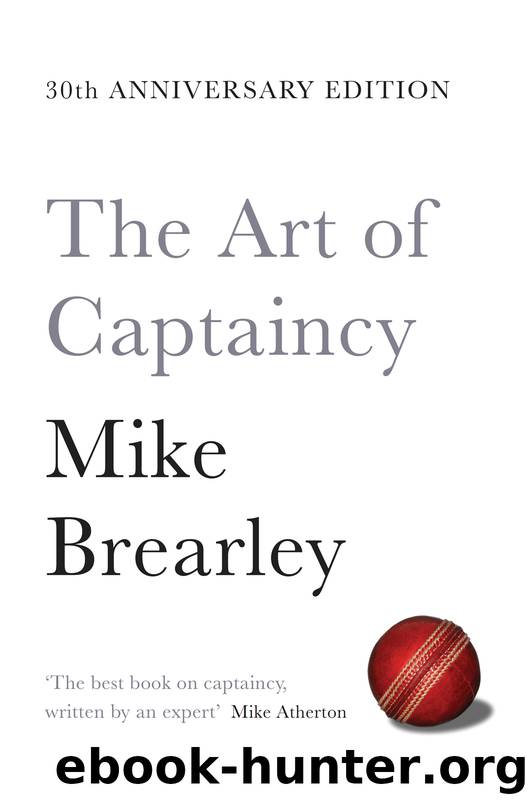The Art of Captaincy by Mike Brearley

Author:Mike Brearley [Brearley, Mike]
Language: eng
Format: epub
ISBN: 9781447294344
Publisher: Pan Books
Published: 0101-01-01T00:00:00+00:00
In order to make his assessment, he needs to take advantage of all possible sources of information: in particular, his own assessment of the pitch and the reports from his representatives at the front – his batsmen. Illingworth records that one of his openers at Leicester, Micky Norman, was especially reliable as a judge of how many runs a one-day pitch would yield, so Illingworth made a point of consulting him as soon as he was out. The same use should be made of such experience in deciding a declaration. Sometimes, of course, everyone is taken by surprise. In the World Cup Final in 1983, I went to the Indian dressing-room when their score was 180–9. I asked Gavaskar, quietly, what his feelings about the match were. ‘We would have liked 280,’ he said. Three hours later, the West Indies were all out for 140.
Gavaskar’s assessment was, I thought, right. His judgement was less sound in 1985 when captaining India against England at Calcutta. In this match he failed to declare the first innings of the match until after lunch on the fourth day – one day having been lost because of rain. India’s score was 438–7; by that time Edmonds was reading a newspaper at square-leg, Gower was bowling, and the crowd were getting so restive that, according to a report, the obdurate Gavaskar called his batsmen in only when the chief of police told him that there would be a riot if India batted any longer. The report was later denied; but the crowd had a right to be incensed, as Gavaskar’s high-handed and quixotic attitude was an insult to them.
Other captains have also had personal though inoffensive reasons for declaring when they did. W.G. declared once when his own score stood at 93; it was the only figure between 0 and 100 that he had not previously tallied.
One final point. In order to gain all the evidence he needs a captain must watch the play. Tony Greig was a captain I admired; yet he rarely watched the cricket when his team were batting. By contrast, I watched almost compulsively, finding it hard to tear myself away. One result was that my mood could swing too much with our fortunes, sometimes perhaps in a way that was unhelpful to ingoing batsmen! But I do believe that Greig captained well in spite of, rather than because of, his ability to switch off from the game in the dressing-room. It is, as Ranjitsinhji says, a captain’s duty to ‘identify himself entirely with the whole play of his side’.
Download
This site does not store any files on its server. We only index and link to content provided by other sites. Please contact the content providers to delete copyright contents if any and email us, we'll remove relevant links or contents immediately.
| Cricket | Field Hockey |
| Lacrosse | Rugby |
| Track & Field | Volleyball |
Going Long by Editors of Runner's World(2362)
The Happy Runner by David Roche(2239)
Yoga For Dummies by Georg Feuerstein(1453)
Becoming Boston Strong by Amy Noelle Roe(1390)
Legacy by Kerr James(1294)
Winger by Smith Andrew(1264)
The Little Red Book of Running by Scott Douglas(1205)
Wodehouse At the Wicket by P.G. Wodehouse(1121)
Bowerman and the Men of Oregon by Kenny Moore(1119)
The Way of the Runner by Adharanand Finn(1104)
5050 by Dean Karnazes(1104)
Running Your First Marathon by Andrew Kastor(1077)
Swim, Bike, Run - Eat by Tom Holland(1051)
Blade Runner by Oscar Pistorius(1019)
The Coming Storm by Nigel McCrery(1011)
Spiked (Blocked Book 3) by Jennifer Lane(1002)
The Grade Cricketer by Dave Edwards(985)
The Amazing Test Match Crime by Adrian Alington(980)
The Shared Origins of Football, Rugby, and Soccer by Christopher Rowley(977)
